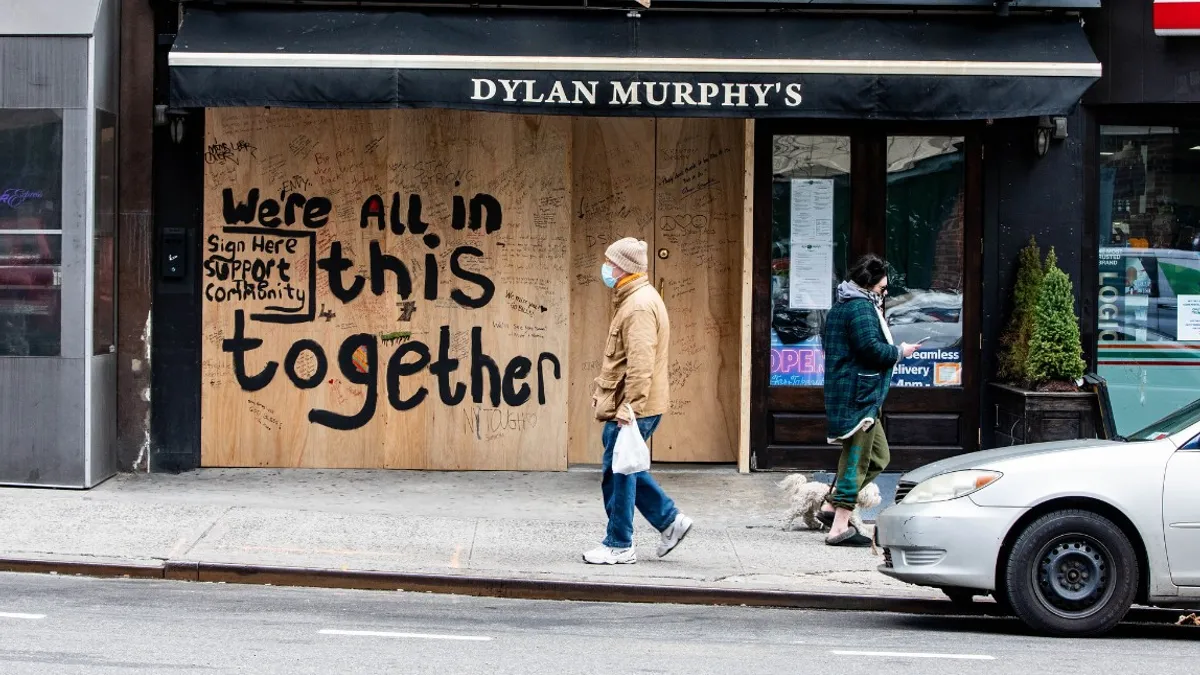Dive Brief:
- Forty-two percent of surveyed consumers believe the coronavirus pandemic will fundamentally alter their shopping habits, according to a new Future Consumer Index published by Ernst & Young. Around one-third (34%) said they will pay more for local products, while 25% will pay more for trusted brands and 23% will pay more for ethical brands.
- EY identified four consumer profiles that have formed during the pandemic, with 27% of people falling into a "Cut Deep" segment that's spending less across the board as they're furloughed or laid off; 26% comprising a "Stay calm, carry on" category that's holding steady and largely unaffected by the pandemic; 35% landing in a more pessimistic, family-oriented "Save and stockpile" group; and just 11% making up a "Hibernate and spend" category that's spending more during the crisis.
- Attitudes toward areas like privacy and purpose are evolving as well, with 54% of respondents saying they are open to sharing more personal data to help monitor and track an infection cluster. EY said traditional notions of status could recede as time, talent and natural resources are crunched, replaced by a bigger focus on purpose and social good.
Dive Insight:
Marketers must keep a close eye on consumer trends during the pandemic, both in terms of how people are altering their shopping habits in the near term and gauging what those habits might look like once the public health crisis subsides. EY's first Future Consumer Index, drawn from a survey of 4,859 people across five markets, suggests many are majorly cutting back on spending — a conservatism that could last as unemployment figures continue to climb and the economy remains on rocky footing through 2020 and potentially beyond.
"Companies were already struggling to keep up with changing consumer behaviors before the pandemic," Andrew Cosgrove, lead analyst at EY, said in a statement. "Now it's even more critical for companies to anticipate how consumers will change and respond to specific segment needs."
However, areas of marketing that were gaining traction prior to the pandemic could leap ahead. These might serve as tactics for courting favor with even the stodgier segments identified by EY, such as the typically older "Cut Deep" consumers, 33% of whom feel brands are far less important in the current climate and as they lose work. EY believes many in the segment could continue cutting into the future.
Purpose-driven campaigns, for instance, are again in the spotlight as consumers look to corporations to fill gaps in messaging and offer practical solutions around the crisis where other institutions fail to. Among "Hibernate and Spend" consumers, nearly half (46%) say brands have actually grown more important to them amid the pandemic, per EY.
Areas like sustainability and ethically minded products could see renewed emphasis as well, as more than a quarter of those surveyed by EY said they're paying greater attention to their consumption choices and the impact they have on the world. Stemming from that, a clearer premium is emerging for local products and brands, indicating that major national marketers might need to retool their strategies and think more about regionalization.
Stoking a sense of consumer confidence is another item marketers should consider on their agendas to offset the pandemic's lingering effects. EY found just 31% of consumers will emerge from the crisis with a "Get to normal" mindset, and only 9.1% will have a "Back with a bang" mentality. Other analysts have identified reassurance as being of paramount importance in offsetting what's shaping up to be a long-lasting atmosphere of public pessimism.
"If you want a job for your advertising, reassure consumers about the future; give them some sense of confidence that the future is something that they should invest in," Walker Smith, chief knowledge officer for branding and marketing at Kantar Consulting, said during a virtual town hall hosted by the Advertising Research Foundation last week.
"That is going to be a crucial requirement for this recovery … That's where I would look as opposed to trying to do something clever with your branding," Smith added.















